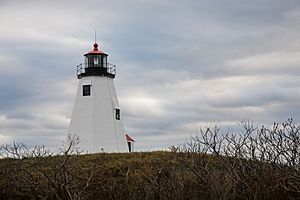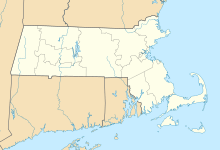Plymouth Light facts for kids
 |
|
|
|
|
| Location | Plymouth, Massachusetts |
|---|---|
| Coordinates | 42°0′13.3″N 70°36′2.2″W / 42.003694°N 70.600611°W |
| Year first constructed | 1768 |
| Year first lit | 1843 (current structure) |
| Automated | 1986 |
| Foundation | Granite |
| Construction | Cedar shingle |
| Tower shape | Octagonal pyramidal |
| Markings / pattern | White with black lantern and red roof |
| Focal height | 102 feet (31 m) |
| Original lens | 4th order Fresnel lens |
| Current lens | 3.9 inches (100 mm) |
| Range | white:17 nautical miles (31 km; 20 mi) & red:15 nautical miles (28 km; 17 mi) |
| Characteristic | Fl W (3) 10s with R sector |
| Fog signal | HORN: 2 every 15s |
| Admiralty number | J0368 |
| ARLHS number | USA-251 |
| USCG number | 1-12545 |
The Plymouth Light, also known as Gurnet Light, is a very old and important lighthouse. It stands on Gurnet Point in Plymouth, Massachusetts. This spot is right at the entrance to Plymouth Bay. To reach the lighthouse, you have to travel through the town of Duxbury. The lighthouse tower is actually inside the old walls of Fort Andrew. This fort was used during the Revolutionary War, the War of 1812, and the Civil War.
Contents
History of Plymouth Light
The Plymouth Light has a long and interesting history. It has changed quite a bit over the years.
Early Beginnings and Changes
The very first lighthouse was built here in 1768. Sadly, it burned down later. In 1801, a new lighthouse was built. This time, instead of one light, there were two! They were built again in 1842, still as a pair of lights.
Over time, Plymouth Harbor started to get filled with sand and dirt. This made it harder for big ships to use the harbor. Because of this, the lighthouse became less important for a while.
Modern Updates and Relocation
A big change happened in 1914 when the Cape Cod Canal opened. This new canal meant many more ships started sailing past Plymouth Light. Because of the increased traffic, the lighthouse needed an upgrade.
One of the two towers was taken down. The remaining tower got a better light, called a fourth-order Fresnel lens. This type of lens helps make the light much brighter and stronger. The old lens is now on display at the Lifesaving Museum in Hull, Massachusetts.
Plymouth Light is special because it is the oldest wooden lighthouse in the United States. In December 1998, the lighthouse had to be moved. It was shifted about 140 feet (43 m) north because the beach was eroding away. This move placed it safely inside the old earthworks of Fort Andrew.
Who Manages the Light Today?
Today, the Plymouth Light and the Duxbury Pier Light are managed by a group called Project Gurnet and Bug Lights, Inc. The Duxbury Pier Light is another lighthouse located about 2.3 nmi (4.3 km; 2.6 mi) southwest of Plymouth Light, out in the open water.
How the Light Works
The actual light at Plymouth Light shines from 102 feet (31 m) above the average high water level.
Light Visibility
Its bright white light can be seen from as far as 17 nautical miles (31 km; 20 mi) away. There is also a red section of light. This red light covers an area called Mary Ann Rocks, warning ships about dangers. The red light can be seen from 15 nautical miles (28 km; 17 mi) away.
National Recognition
Plymouth Light is recognized as an important historical site. It was added to the National Register of Historic Places on March 8, 1977. It is listed as the Plymouth Light Station.
Images for kids
 | Toni Morrison |
 | Barack Obama |
 | Martin Luther King Jr. |
 | Ralph Bunche |




